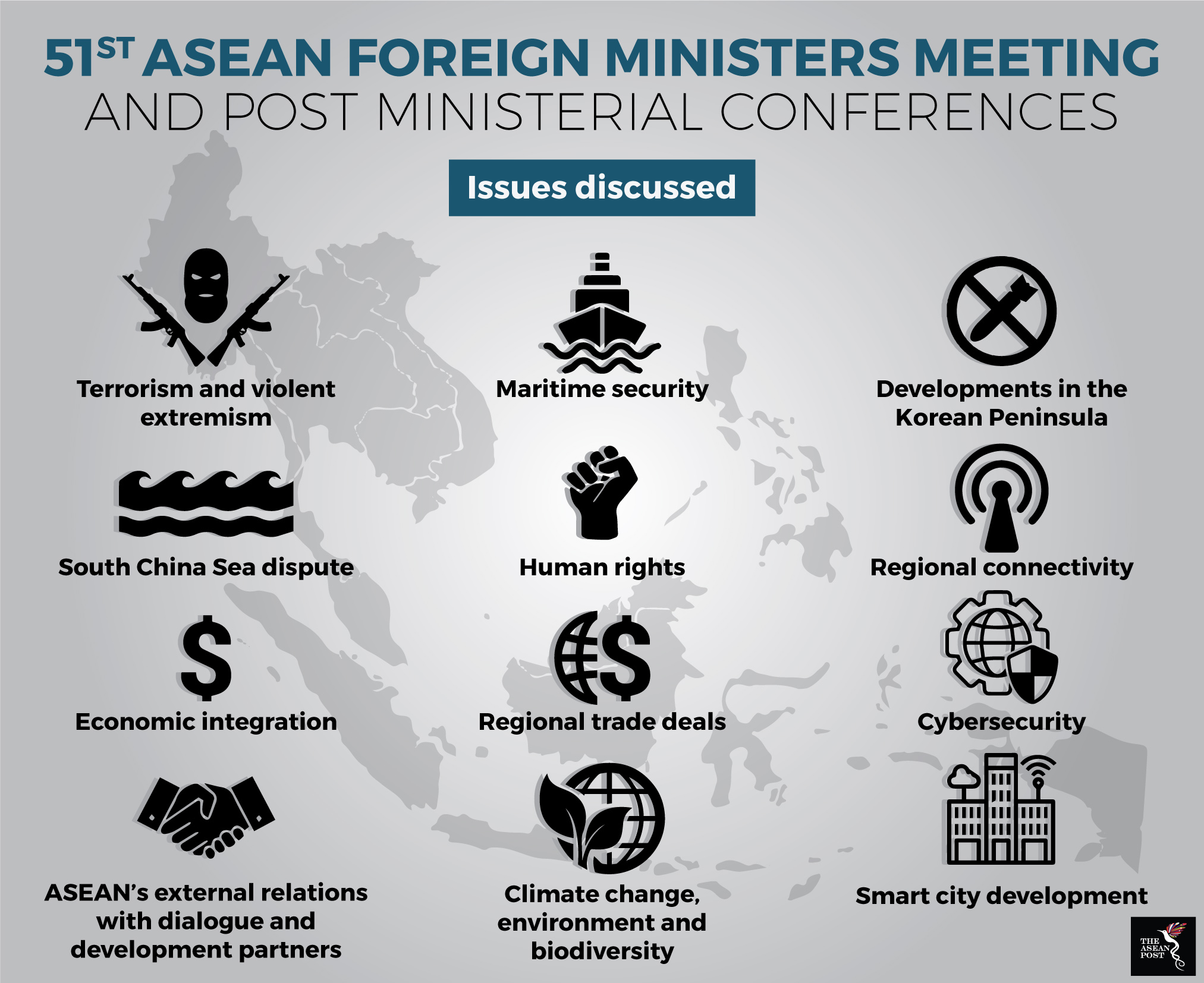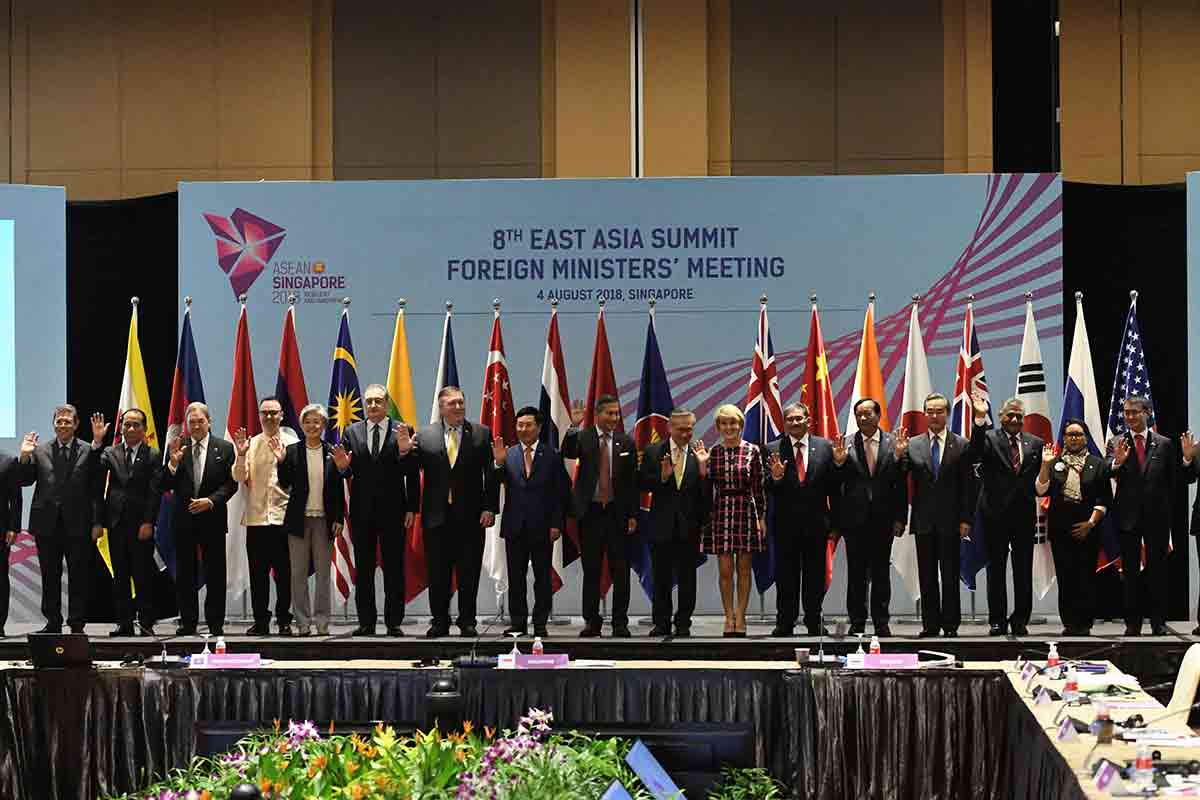Foreign Ministers of the Association of Southeast Asian Nations (ASEAN) gathered in Singapore over the weekend for the 51st ASEAN Foreign Ministers Meeting and Post Ministerial Conferences.
Among the issues discussed included sustainable urban living, economic integration and hot button topics like the South China Sea, terrorism and violent extremism as well as developments in the Korean Peninsula.
Maritime cooperation
Ministers concluded a single draft document which would form the basis for further negotiations for a code of conduct in the South China Sea.
Singapore’s Foreign Minister, Vivian Balakrishnan hailed this as “yet another milestone” in the longstanding dispute between China and other ASEAN claimant states (Malaysia, Brunei, Vietnam, and the Philippines).
“Right now, everyone is glad that we have reached this stage. Everyone hopes that we will be able to accelerate the process but I’m not in the position to set specific deadlines," he said, adding that there should be some degree of flexibility to negotiations so that countries don’t feel “locked in.”
China raised Western eyebrows when it stated its intentions to stage joint military exercises with its ASEAN counterparts while excluding the United States (US) and Australia. In a move which analysts say is an effort to stymie further US influence in the region, Beijing suggested that such drills should be conducted on a regular basis. It also called for joint oil and gas exploration in the disputed waters of the South China Sea.
Regional trade deals
Ministers pledged to work towards the swift conclusion of the Regional Comprehensive Economic Partnership (RCEP) by the end of the year.
If completed it would create the world’s largest trading bloc. Members of the RCEP are all 10 ASEAN member states, Japan, South Korea, China, India, New Zealand and Australia, when put together represent one-third of the world’s gross domestic product (GDP).
The mega deal covers trade in goods and services, investment, economic and technical cooperation, intellectual property, competition, dispute settlement and e-commerce.
Against global protectionist undertones and US rescindment of the Trans Pacific Partnership (TPP), the RCEP stands as the alternative for ASEAN members seeking to advance the trade liberalisation agenda. However, in his speech, Singaporean Prime Minister, Lee Hsien Loong warned that negotiations may not be easy given rising nationalist sentiments throughout the region.
Nevertheless, participating RCEP economies have a point to prove against the worrying trend of economic protectionism, threats of a US-China trade war, and an overall global political mood against free trade. Most – if not all – of the 16 countries are emerging economies that cannot afford to be left out of the international trade order or risk reversing substantial economic gains garnered thus far.
Situation in Rakhine State
The plight of persecuted Muslims living in Myanmar’s northern Rakhine State was also discussed. Whilst the international community has levelled much criticism on Myanmar’s government over its handling of the humanitarian crisis, ASEAN has stuck to its typical non-interventionist agenda.
Ministers expressed continued support for humanitarian relief programs including the ASEAN Coordinating Centre for Humanitarian Assistance (AHA) Centre’s ongoing work with the Myanmar government-led mechanism to deliver humanitarian assistance to all displaced persons. They also encouraged Myanmar to continue to implement the remaining recommendations of the final report of the Advisory Commission on Rakhine State.
Besides that, the Ministers welcomed efforts made to implement the Memorandum of Understanding (MoU) signed between Myanmar, the United Nations High Commissioner for Refugees (UNHCR) and United Nations Development Programme (UNDP) in June this year. The MoU outlined steps to facilitate the repatriation process of displaced persons from Rakhine State.

Source: Various sources
Korean Peninsula
During the ASEAN Regional Forum (ARF), North Korea criticised the US for its impatience with regards to the issue of denuclearisation. This came after US Secretary of State Mike Pompeo stressed that pressure needed to be maintained on Pyongyang.
At historic talks in Singapore last June, US President Donald Trump met with North Korea’s leader, Kim Jong-un and they both agreed to commit to the “denuclearisation of the Korean Peninsula” as opposed to the US’ longstanding demands for a complete, verifiable and irreversible disarmament.
North Korea’s Foreign Minister Ri Yong Ho insisted that his country stood “firm in its determination and commitment” to implement the historic agreement.
At the same forum, Pompeo emphasised “the importance of maintaining diplomatic and economic pressure on North Korea.” Nevertheless, he maintained his optimism on the prospects of North Korea holding up their end of the bargain in terms of denuclearisation.
On Saturday, both Ri and Pompeo met briefly and the US top diplomat even greeted his North Korean counterpart at a joint photo session with the ministers. The pair shook hands and were seen smiling and exchanging words.
US State Department spokeswoman Heather Nauert described the encounter as a “step in the right direction” given frosty relations between the two just a year ago due to the North’s continuous weapons test.
Natural disasters
Recent events such as the earthquake in Lombok, Indonesia as well as the dam failure and tropical storms in southern Lao PDR were also on the agenda.
Lee began his speech to foreign dignitaries by offering his condolences to victims in the affected areas.
“Singapore and ASEAN stand ready to support our Laotian and Indonesian friends during this difficult time,” he said.
Leaders were also briefed on the situation in Lao PDR where the AHA Centre – ASEAN’s disaster management and emergency response organisation – had delivered two initial batches of relief items.
Countering terrorism
ASEAN leaders reaffirmed their commitment to combat the scourge of violent extremism, radicalisation and terrorism in the region.
They reiterated their support for counter-measures at the national, regional and sub-regional levels in line with the ASEAN Convention on Counter-Terrorism (ACCT) and other United Nations (UN) counterterrorism doctrines.
Thus far, positive efforts have been undertaken after the signing of the Manila Declaration at the end of last year. Plans are underway to finalise an ASEAN Plan of Action (POA) to prevent and counter radicalism and violent extremism in the region.
Later in October, Singapore will be leading a Track 1.5 symposium on counterterrorism titled, “The 2018 Southeast Asia Counter-Terrorism Symposium: A Collective Approach.”
Smart City development
As ASEAN chair for this year, one of Singapore’s foremost priorities is to develop a region-wide smart cities network.
Comprising of 26 cities in all 10-member states, the ASEAN Smart Cities Network (ACSN) had signed five deals with private firms to begin developing a common framework for use by all the earmarked smart cities in the region.
The leaders also reaffirmed their support for further research into advancing sustainable urbanisation in the region. This would primarily be aimed at increasing the deployment of smart urbanisation models across ASEAN in line with the aspirations of the ASCN.
